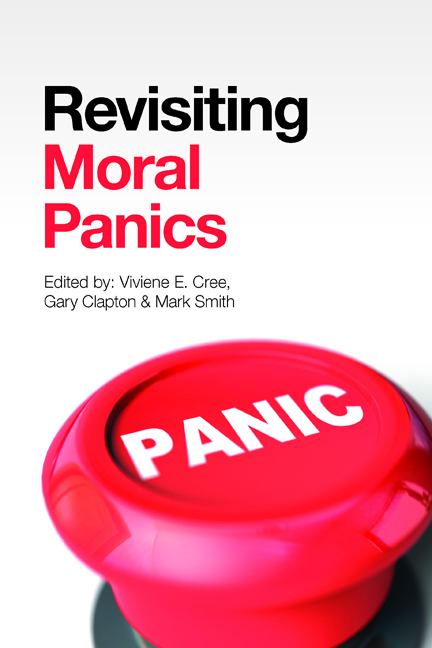Book contents
- Frontmatter
- Contents
- Contributors
- Preface
- Commentary moral panics yesterday, today and tomorrow
- Part One Gender and the family
- Part Two Moral panics in our time? Childhood and youth
- Part Three The state, government and citizens
- Part Four Moral crusades, moral regulation and morality
- Afterword the moral in moral panics
- Conclusion Moral panics and beyond
- Index
Afterword
Published online by Cambridge University Press: 08 March 2022
- Frontmatter
- Contents
- Contributors
- Preface
- Commentary moral panics yesterday, today and tomorrow
- Part One Gender and the family
- Part Two Moral panics in our time? Childhood and youth
- Part Three The state, government and citizens
- Part Four Moral crusades, moral regulation and morality
- Afterword the moral in moral panics
- Conclusion Moral panics and beyond
- Index
Summary
I remember first coming across Cohen's ground-breaking work on moral panics when I was an undergraduate sociology student; featuring evocative accounts of leather-clad rockers clashing with sharp-suited soul aficionados on the beaches of Brighton, Cohen analysed the process by which certain groups came to be deemed as threats to the social order by the media and establishment figures, and how public attitudes were manipulated to generate a groundswell of intolerance. It was irresistible stuff for the younger, left-lurching, Che Guevaraworshipping incarnation of myself. Yet, during my post-graduate training to become a social worker, and the several years I have spent working in the criminal justice system and children's services, it is not a body of work that I have ever returned to. When I read the contributions in this volume, which focus on the complex relationship between moral panics, the state and the profession of social work, I realise how many of the ideas and issues presented here speak to my day-to-day experience of being a front-line practitioner.
As the Introduction to Part Three acknowledges, the concept of the state is somewhat nebulous and notoriously difficult to nail down. Unsurprisingly, many different sociologists have wrestled with the subject. One of the most influential was Weber (1994 [1919]), who sought to explain how the nature of the state has evolved throughout history. He suggested that the success of early forms of social organisation hinged on the charismatic influence of certain leaders. Feudal monarchies would later invoke the power of tradition and custom to maintain their subjects’ loyalty. In liberal democracies the state commandeers the technical expertise required to operate a complex system of laws, regulations and public institutions, but also monopolises the legal use of any violent force. The key contribution of Hall et al (1978) was to recognise how the state could suppress political challenges to its authority in more subtle ways: through exploiting public concerns about certain social issues, such as crime, the state can justify the introduction of policies that effectively erode civil liberties. As many social workers involved in some form of safeguarding role in relation to children and adults are employees of the state, I felt that Hall's theories posed some unsettling questions for our profession, which I explore below.
- Type
- Chapter
- Information
- Revisiting Moral Panics , pp. 189 - 194Publisher: Bristol University PressPrint publication year: 2015



